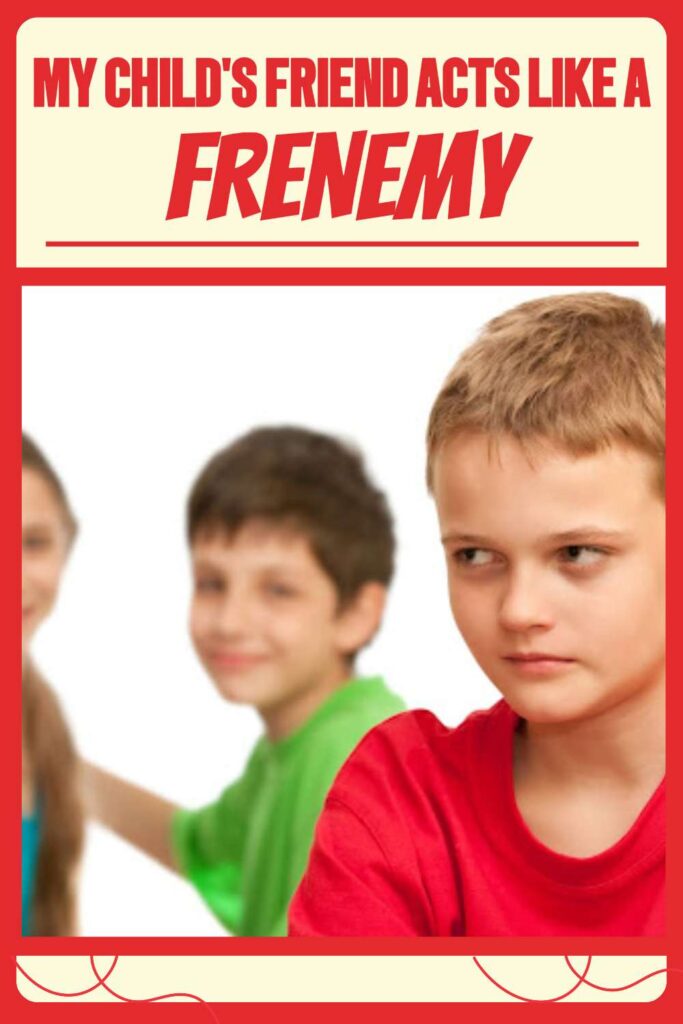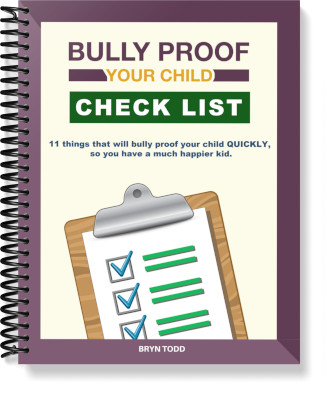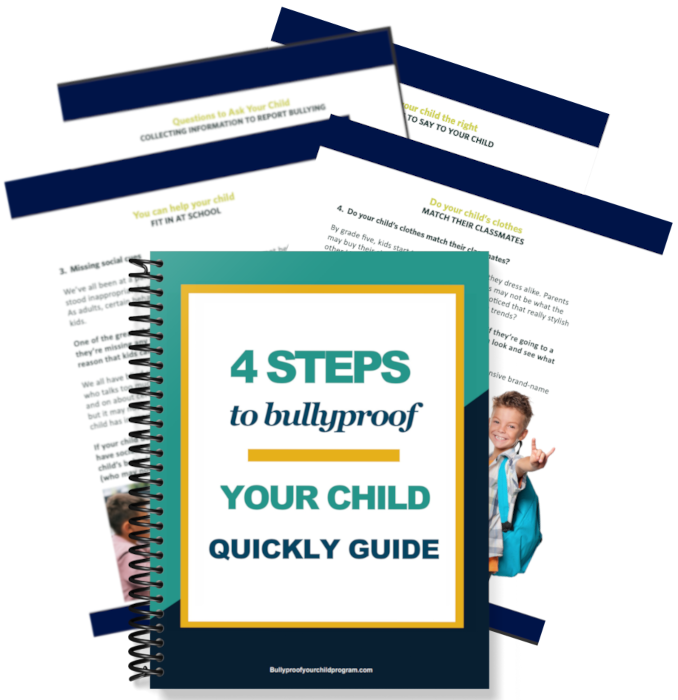
Most kids are going to have to deal with a frenemy at some point in elementary school. A frenemy is someone who pretends to be a friend but secretly holds negative feelings towards you. They can be manipulative, competitive, and sometimes even hostile.
Recognizing the signs of frenemy behavior and knowing how it differs from genuine friendship is important in helping your child navigate these complicated relationships.
By understanding what a frenemy is, you can better support your child in dealing with this challenging situation and ensure they know what true friendship should feel like.
Characteristics of Frenemy Behavior
Frenemies can be hard to spot, but they often show certain behaviors that can hurt your child.
Here’s what to watch out for:
1. Passive-Aggressive Communication: They might say things that seem nice on the surface, but underneath, they’re meant to hurt. Sarcasm and backhanded compliments are common ways they try to put your child down.
2. Jealousy and Undermining: Frenemies may be jealous of your child’s accomplishments and might try to downplay or sabotage them.
3. Constant Criticism: They’re quick to point out your child’s flaws and weaknesses, making them feel bad about themselves instead of offering support.
4. Unreliable Behavior: Frenemies can be inconsistent—friendly one moment and distant the next, leaving your child confused and hurt.
5. Gossip and Betrayal: They may talk behind your child’s back, spreading rumors or sharing personal information without permission, which can be deeply hurtful.
Frenemy vs. True Friendship
It’s important to know the difference between a frenemy and a true friend. True friends might disagree with you or have conflicts, but they’re always supportive, honest, and respectful. They cheer for your successes, give you constructive feedback, and stand by you during tough times.
Frenemies, on the other hand, might act like they’re your friend but secretly hope to see you fail. They might exploit your vulnerabilities or only be kind when it benefits them.
Recognizing these differences helps you protect yourself and ensure you’re surrounded by people who genuinely care about you.
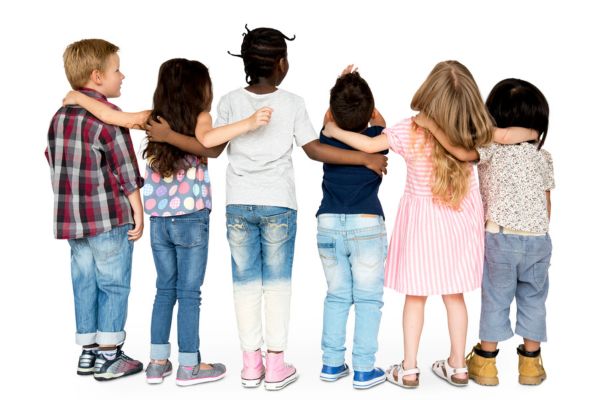
Understanding these distinctions can help you and your child build healthier relationships and steer clear of toxic individuals who don’t have your best interests at heart.
Parental Guidance
Watching your child struggle with a frenemy can be tough. You want to protect them from the pain, but you might not know where to start. There are steps you can take to help them navigate this challenging situation and support them through it.
Communicating with Your Child
The first step is to talk with your child. Let them know that you’re here to listen and support them.
Encourage them to share their feelings and experiences with their friends, and reassure them that they’re not alone. Remind your child that you’re there to help them through this, no matter how tough it feels.
Setting Boundaries
Helping your child set boundaries is crucial when dealing with a frenemy. Sit down together and discuss what behaviors are okay and what crosses the line.
Encourage your child to stand up for themselves and clearly communicate these boundaries to their friend. It’s important for them to understand that they have every right to say no and to set limits on what makes them comfortable.
Encouraging Positive Friendships
Encouraging your child to build positive friendships is crucial in helping them move past a frenemy. Support them in finding friends who share their interests and values.
Help your child recognize the good qualities in these friends and focus on nurturing healthy, supportive relationships.
By talking with your child, setting clear boundaries, and guiding them toward positive friendships, you’re helping them navigate this tough situation with a frenemy.
Identifying the Signs
If you suspect your child’s friend might be acting like a frenemy, it’s important to recognize the signs. Here’s what to watch for:
Inconsistent Behavior
One of the clearest signs of a frenemy is inconsistent behavior. Your child’s friend might be warm and friendly one day, only to turn cold or distant the next.
They may frequently change their mind or cancel plans at the last minute, leaving your child feeling confused and hurt. It’s important to talk with your child about how this behavior affects them and help them understand that they deserve friends who are reliable and kind.
Competitive Nature
A key sign of a frenemy is a constant need to compete. Your child’s friend might always try to one-up them, whether in sports, academics, or social situations. They may also be quick to point out your child’s flaws or weaknesses. While this behavior might stem from their own insecurities, it can seriously harm your child’s self-esteem.
Exclusion and Gossip
Frenemies might exclude your child from activities or events, or spread rumors and gossip about them. They may even try to turn mutual friends against your child, leaving them feeling isolated and hurt.

For a child, this kind of behavior can be especially painful, and they might struggle to know how to respond.
It’s so important to talk to your child about these signs of frenemy behavior. Help them understand that they deserve better and guide them in developing strategies to cope.
Encourage open communication, setting boundaries, and surrounding themselves with positive, supportive friends. With your love and guidance, your child can face these tough social situations and come out stronger and more confident.
More posts you may like
- My child was kicked out of a friend group
- My child eats lunch alone
- What to say when your child is being excluded at school
- When your child says nobody likes me
Handling the Situation
Dealing with a friend who acts like a frenemy can be challenging, but there are steps you can take to help your child through it.
Confronting the Frenemy
Encourage your child to speak up when their friend is being hurtful or manipulative. Teach them to use “I” statements to express their feelings calmly and respectfully.
For example, they could say, “I feel hurt when you talk about me behind my back.” Helping your child assert themselves in this way empowers them to stand up for their feelings while keeping the conversation respectful.
Supporting Your Child Emotionally
Make sure your child knows you believe them and that their feelings are valid. Be there to listen and offer a comforting shoulder when they need it. Help boost their self-esteem and confidence by reminding them of their strengths and the wonderful qualities they possess.
Seeking External Help
If the situation feels too overwhelming to handle on your own, don’t hesitate to seek help from a therapist, counselor, or school guidance counselor. They can offer your child extra support and guidance in navigating this difficult time.
Always take your child’s feelings seriously and help them learn how to build healthy, positive friendships. With your love and support, they can develop the skills to handle tough situations and foster strong, meaningful relationships.
Fostering a Healthy Environment
When your child is dealing with a friend who acts like a frenemy, it’s essential to create a healthy environment for them. You can do this by promoting empathy and understanding in your home and teaching your child how to resolve conflicts in a positive way.
Promoting Empathy and Understanding
Encouraging your child to empathize with their friend’s feelings can help build a healthier relationship.

Ask your child to imagine themselves in their friend’s shoes and think about how they might feel in the same situation. This can help them better understand their friend’s behavior and motives.
It’s also important to teach your child how to communicate their feelings effectively. Encourage them to express their emotions calmly and respectfully, while also listening to their friend’s perspective.
This approach can prevent misunderstandings and foster a deeper connection between your child and their friends.
Teaching Conflict Resolution Skills
Helping your child learn conflict resolution skills can make a big difference in how they handle tough situations with their friends.
Encourage them to identify the problem, think of possible solutions, and weigh the pros and cons of each option. This approach not only helps them develop critical thinking but also teaches them how to resolve conflicts peacefully.
It’s also important to show your child the value of compromise and negotiation. Encourage them to find common ground with their friends and work toward a solution that benefits both sides.
By learning to resolve conflicts in a positive, constructive way, your child can build healthier relationships.
When to Step In
As a parent, it can be challenging to decide when to step in and address your child’s situation with a frenemy. However, there are moments when your involvement is crucial.
Here are a few situations where it may be necessary to intervene:
Bullying and Harassment
If your child’s friend is bullying or harassing them, it’s essential to step in right away. This kind of behavior can have serious long-term effects on your child’s mental health and well-being.
Sit down with your child, listen to what they’re going through, and work together to create a plan to address the situation. This might involve talking to the friend’s parents or involving school officials.
Your prompt action can make all the difference in protecting your child and ensuring they feel safe and supported.
Impact on Child’s Well-being
If your child’s experience with a frenemy is causing them significant emotional distress, it’s essential to step in and address the situation.
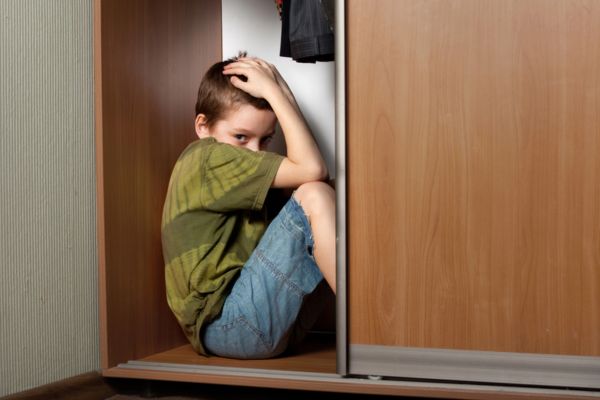
You might consider limiting their contact with this friend or encouraging them to seek out new friends who treat them with the kindness and respect they deserve. Your child’s well-being should always come first.
By knowing when to take action, you’re helping your child navigate the complexities of friendships and guiding them toward healthy, positive relationships.
Frequently Asked Questions:
1. How can you help your child deal with a friend who is both kind and unkind at times?
It can be difficult for your child to handle a friendship with someone who acts like a frenemy. Encourage them to talk openly and honestly with their friend about how their behavior affects them. Help your child set boundaries and teach them how to stand up for themselves. Also, encourage them to spend time with friends who consistently treat them well and make them feel valued.
2. What should you say to your child when their friends treat them poorly?
Let your child know that it’s not their fault and that they deserve to be treated with respect and kindness. Reassure them that no one should make them feel bad about themselves. Encourage them to talk to you, a trusted adult, or a counselor about their feelings and experiences. Help them recognize what healthy friendships look like and support them in spending time with friends who uplift and care for them.
3. What steps should you take if your child is being systematically left out by their friend group?
Encourage them to explore new activities and hobbies that interest them and offer opportunities to meet new people. Remind them that true friends will accept them for who they are, and they should never feel the need to change to fit in. Support them in focusing on building positive relationships with people who genuinely value and appreciate them.
4. How can you support your child through the experience of losing close friends?
Losing close friends is painful, but it’s something many of us go through as we grow and change. Encourage your child to cherish the positive memories and experiences they had with their friends. Help them find new opportunities to meet people and make new friends who share their interests. Encourage open and honest conversations about their feelings, and remind them that they’re not alone; you’re here for them every step of the way.
Conclusion
Dealing with a friend who acts like a frenemy can be incredibly challenging, but it’s important to remember that it’s not your fault. As a parent, you naturally want your child to have positive friendships, but it’s crucial to recognize when a relationship becomes unhealthy.
One way to help your child is by setting clear boundaries. Let them know it’s okay to say no and to stand up for themselves. Encourage them to spend time with friends who genuinely make them feel good about themselves.
Talk openly with your child about what a healthy friendship should look like. Discuss the qualities of a good friend; honesty, kindness, and respect. Help them understand that it’s okay to walk away from a friendship that doesn’t bring them happiness.
Above all, your child’s happiness and well-being should always come first. Don’t hesitate to seek support from a counselor or therapist if your child is struggling with their friendships. With your love, patience, and understanding, you can help them navigate the ups and downs of growing up and forming meaningful, healthy relationships.
